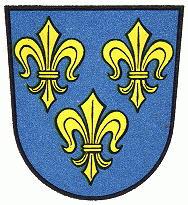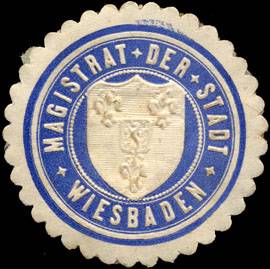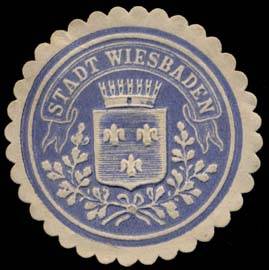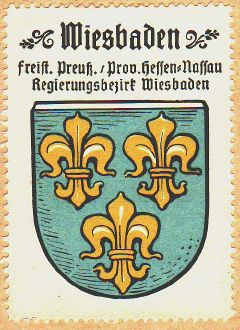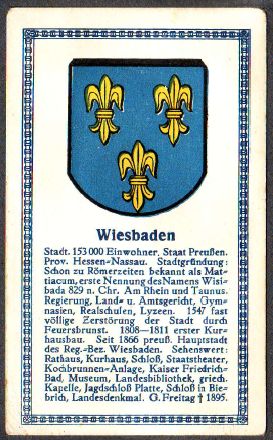Wiesbaden
| Heraldry of the World Civic heraldry of Germany - Deutsche Wappen (Gemeindewappen/Kreiswappen) |
WIESBADEN
State : Hessen
Urban District (Kreisfreie Stadt) : Wiesbaden
Additions : 1926 Biebrich, Schierstein, Sonnenberg; 1928 Bierstadt, Dotzheim, Erbenheim, Frauenstein, Hessloch, Igstadt, Kloppenheim, Rambach; 1945 Amöneburg, Kastel, Kostheim; 1977 Auringen, Breckenheim, Delkenheim, Medenbach, Naurod, Nordenstadt
Boroughs (never separate municpalities) : Klarenthal
Official blazon
Origin/meaning
The arms of Wiebaden are identical to the former French Royal arms, and it has been stated that the arms were granted by Charlemagne, or that the arms were used as a symbol for Charlemagne, the alleged founder of the city. However, this is not likely, as in the time of Charlemagne there were no heraldic arms, and he never used fleur-de-lis (lilies) as his symbol.
Wiesbaden was an imperial city until 1250, when it became a possession of the Counts of Nassau. The oldest known seals date from the early 14th century and show the lion of Nassau. Around 1350 three roses were added, probably to distinguish the arms from similar arms in the County of Nassau. In the early 16th century the roses were replaced by the three lilies. Later that century the lion was removed, at first in images and on buildings. later also in the seals of the city.
In 1898 the city officially adopted the arms with the lion, based on the old seals, but these arms were already replaced in 1906 by the present, and more historically correct, arms.
| Seal from around 1900 with the lion in the arms |
Seal from around 1910 |
| The arms in the Kaffee Hag albums +/- 1925 |
The arms on a trade card, 1920s |
| The arms on a matchbox label, 1960s |
Literature : Stadler, K. : Deutsche Wappen - Bundesrepublik Deutschland. Angelsachsen Verlag, 1964-1971, 8 volumes.

